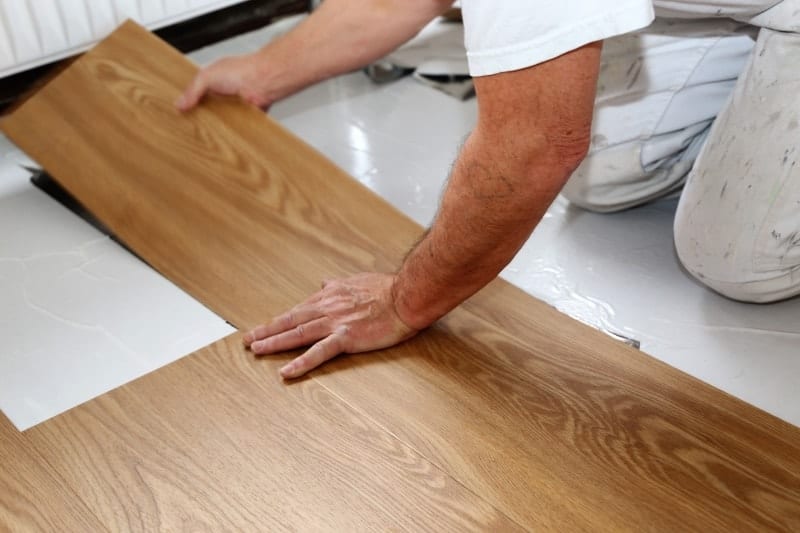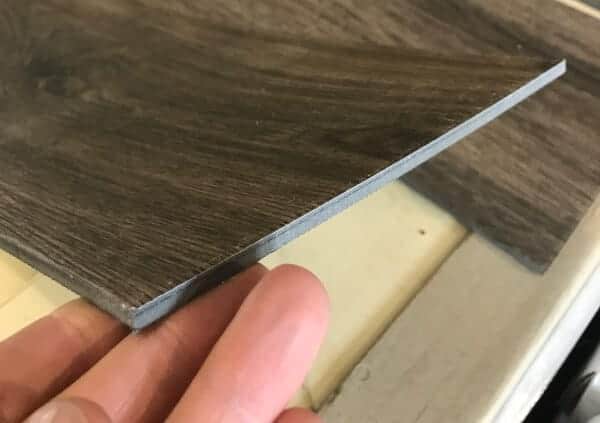Are vinyl floors healthy?
Many of our customers are concerned about the question of whether vinyl soils contain harmful substances, which could harm health in the long term.
Vinyl flooring, for example, is suspected of being a heavy burden on the environment already during production or of containing harmful plasticizers.
This article explains:
- how the different types of flooring are produced,
- what they consist of,
- which substances are actually contained
- and for what reasons vinyl floors are generally harmless to health
Environmentally friendly vinyl floor without pollutants
Especially the European vinyl flooring manufacturers have faced up to their responsibility in recent years and put a lot of development work into the production of environmentally friendly vinyl floors.
The objectives were, among other things, to make the coatings as climate neutral as possible and to equip them in such a way that they do not harm the environment during disposal.
Today, there is a huge selection of hard-wearing, extremely easy-care vinyl floors that do not contain any plasticizers that are harmful to health, such as phthalates contained in conventional PVC.
The development has now even progressed so far that some producers offer so-called organic soils with softening components from rapeseed oil that meet the strictest EU specifications.

Features of easy-care vinyl flooring in terms of health
As early as the 1980s, the testing procedures of independent and state institutions were tightened and the production processes of modern PVC floors were drastically improved.
Since then, not only have the properties of vinyl soil improved with respect to health and the environment, but also its properties have improved. Due to their composition and surface structure, advanced vinyl floors are extremely hard-wearing, slip-resistant, footfall sound absorbing, hygienic, anti-allergic and easy to clean.
Neither toxic ingredients nor dangerous plasticizers endanger health, so a vinyl flooring without harmful substances can be laid without hesitation in living rooms, bathrooms, children’s rooms, doctors’ surgeries, hospitals and other public facilities. In addition, the diverse designs leave plenty of room for the various design options.
Homogeneous or heterogeneous: Which vinyl floor is better for health?
Homogeneous Vinyl Floor & Health
Homogeneous floor coverings made of solid vinyl are usually produced as sheet material. Because they consist of only one material composition throughout, experts often speak of so-called single-layer coverings. A single-layer vinyl floor without pollutants consists of about 55 % PVC, fillers, additives and pigments. In a special mixing process, the components are mixed together and then formed into webs by means of rollers under the influence of strong heat.
Heterogeneous Vinyl Flooring & Health
In comparison, heterogeneous coverings consist of several layers, mostly bottom support layers such as HDF or MDF and an upper wear layer. The upper layer consists of the components already mentioned and is mainly responsible for the useful life. The carrier layers are enriched with chalks, fillers, additives, stabilizers, sometimes also with formaldehyde.

Conclusion regarding health and the environment:
Although a floor with a carrier layer such as click vinyl may contain formaldehyde, for example, neither a homogeneous nor a heterogeneous constructed vinyl floor has a detrimental effect on health. In addition, a vinyl floor produced in the EU contains so few pollutants in permissible quantities according to the directive that it does not pose a problem for the environment either during production or disposal.
Full vinyl without pollutants vs. vinyl floor with carrier layer
Other major advantages and disadvantages
Although a heterogeneous vinyl flooring does not pose a risk to health any more than sheet material, it is clearly inferior to homogeneous floorings in terms of durability and water resistance .
That is why so-called (mostly heterogeneous) click vinyl floors are mainly used in the private sector or in less stressed rooms. By contrast, homogeneous vinyl floors made of solid vinyl are extremely hard-wearing and, in the case of professional vinyl flooring, are laid using adhesive absolute waterproof. This makes them the ideal choice for highly frequented private rooms, kitchens, wet areas such as showers and baths as well as for public facilities such as schools, doctors’ surgeries or hospitals.
Vinyl floor without pollutants: recognition features
Vinyl floors manufactured in the EU are subject to strict legal requirements.
Plasticizers in the vinyl flooring that could be potentially hazardous to health, such as phthalates or other harmful additives are prohibited. Well-known manufacturers guarantee that their vinyl flooring is harmless to health and the environment with the corresponding packaging information, data sheets and test seals.
In addition, it is recommended to purchase the floor covering from a certified manufacturer in an authorised specialist trade or from a specialist installation company that is familiar with all the properties.

High-quality, durable vinyl flooring for health and environment
Customers who want a durable, long-lasting hygienic vinyl flooring should opt for solid vinyl and commission a specialist company to carry out the professional laying using the wet adhesive method.
The main reasons are:
- Vinyl floor without pollutants, in accordance with strict EU directive.
- Solid vinyl is guaranteed to contain no formaldehyde, which is why a professionally installed, homogeneous vinyl floor is more beneficial to health than a click floor with HDF/MDF backing.
- As a rule, vinyl planks are glued together. A specialist company uses solvent-free adhesives in accordance with EU regulations. If, in special cases, the use of a different adhesive should nevertheless be necessary, the installation company will explicitly point this out to the customer or suggest an alternative.
- On request detailed on-site sampling.
- A professionally laid vinyl floor meets the building regulations.
- Fast, clean installation including careful site cleaning and cleaning.
- Extensive warranty claims.
- From consultation to planning, punctual delivery and professional installation: Everything from one source at a fair price-performance ratio.
Professionally laid vinyl flooring: a plus for health and money
Due to their properties and the low installation height vinyl floors are ideal for renovations.
A vinyl floor without danger to health can also be laid on underfloor heating.
Whether private premises, business premises, medical facilities or public areas: A laying specialist company is very familiar with the peculiarities of every laying situation and is therefore the ideal contact partner when it comes to attractive floor coverings without pollutants.
Due to many years of experience and continuous further training, our professionals not only have a trained eye for the optimal design, they also dispose of your old flooring if necessary, prepare the substrate optimally and use the adhesive suitable for the installation situation.
Properly laid vinyl flooring means health and lifelong service
With their professional service, the experts always guarantee a professional execution as well as an optically perfect, long-lasting result. And even after installation, the friendly staff competent contact persons remain available to answer all your questions about your vinyl floor, its health, care or necessary repairs.
Table of Contents



